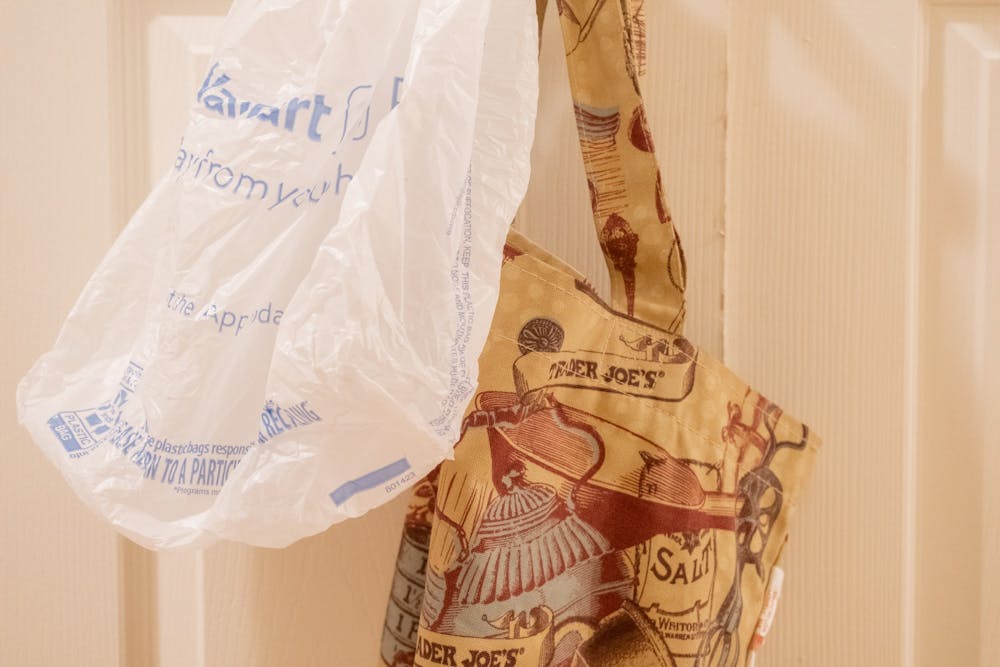The University has posed a new challenge for students, faculty and staff — break up with single-use plastics. The PlasticFree2023 challenge provides resources and suggestions for reducing plastic use to individuals who sign the pledge. Some students, though, worry that the University is still not doing enough to reduce waste.
According to Shannon Sahs, outreach and engagement coordinator for the Office of Sustainability, the challenge has been relatively successful thus far.
“We've had a lot of people take the PlasticFree2023 pledge, and I would say over half of the participants have been undergrad students, which is awesome,” Sahs said. “Employees are also very enthusiastic, and we just overall see a really positive response from the U.Va. community.”
Participants receive a monthly email detailing ways to reduce plastic waste and opportunities for people to win monthly giveaways and raise awareness for the University’s single-use plastic policy. Previous emails have called on participants to “break up” with a favorite single-use plastic item and asked them to have a friend sign the PlasticFree2023 pledge.
The University began prohibiting certain forms of single-use plastics July 2021, including food containers, disposable bags and water bottles. This, along with the recent PlasticFree2023 campaign, are part of the University’s 2030 Sustainability Plan, which includes goals to become carbon neutral and reduce the University's waste footprint by 70 percent of its 2010 levels.
As of the end of 2021, the University has reduced the amount of waste it produces by 39 percent of 2010 levels — accounting for all forms of waste, not just plastic. According to Sahs, the University has made significant progress on waste reduction goals.
“We've just transitioned away from single use plastic water bottles on grounds to aluminum bottles… [including] in the athletic facilities like Scott Stadium,” Sahs said. “All of the plastic bottles there this past season were switched to aluminum bottles, which are infinitely recyclable, and all of that material was hand sorted by the U.Va. recycling department.”
Although the University has made strides in reducing plastic waste, these policies do not apply to certain items such as energy drinks and packaged snacks in plastic containers. Sahs said that the policies on waste reduction could be updated in the future.
For some, including third-year Engineering student Kate Van Meter, the University’s sustainability efforts are promising but inaccessible without proper education on proper composing methods, especially for compostable plastics. Van Meter, who has previously worked with the Office for Sustainability’s Materials Working Group, noted that composting can be confusing and many do not understand exactly how it works.
“There are aspects of what the University is doing that are actually good and making good steps, but some of it does feel a little bit performative,” Van Meter said. “For example, replacing the plastic containers with compostable… most people don't realize that if you don't put something compostable in an actual composting facility, all the benefits of composting are lost.”
The 2030 Sustainability Plan was developed after former Virginia Governor Ralph Northam signed Executive Order 77, which restricted the use of single-use plastics at state agencies, including universities. In April 2022, Governor Glenn Youngkin passed Executive Order 17, which rescinded the previous order and does not restrict institutions from using any materials.
Despite this change in policy, Sahs said that the University continues to reduce the use of single-use plastics and other materials on Grounds. Sahs also said that in order to provide a clear objective for students and faculty, the University aims to prioritize raising awareness of reusable materials over promoting recycling and composting.
“We really wanted to spread awareness about our overall waste reduction goal, the 70 percent reduction by 2030… but we wanted to give people something specific to focus on for an annual basis,” Sahs said.
Another important element of waste-reduction on Grounds is prohibiting the use of University funds to buy single use plastics for events and conferences. Aluminum bottles are available for purchase in bulk through U.Va. Marketplace — an electronic shopping portal for the University.
Some students, including second-year Engineering student Sarah Kirk, noted that while they thinks the University is making good progress towards sustainable goals, it can be difficult to make these efforts known to the large community of students.
“I think the biggest issue is [that] all of that information — on sustainability, on zero waste, on composting and recycling — is out there [and] hosted by U.Va.,” Kirk said. “It's just that students don't necessarily think to go looking for it.”
Students, faculty and staff can access information on hosting zero waste events and read about waste policies on the U.Va. Sustainability website. The PlasticFree2023 campaign aims to increase awareness of the single-use plastic policy.
Van Meter said that she believes the University has the resources to improve their sustainability efforts and provide more convenient, accessible resources for students and faculty to reduce usage of single-use plastics.
“There's definitely good and bad things that they're doing,” Van Meter said. “I appreciate that they're moving in a direction towards sustainability, and I feel like a lot of the things they do are genuinely going for that.”







